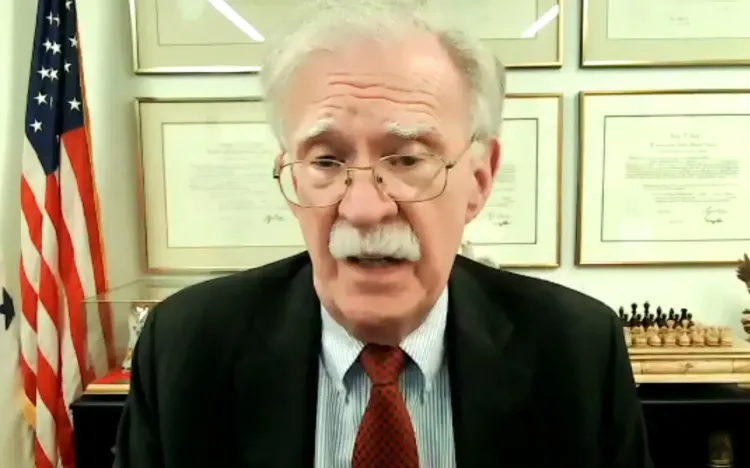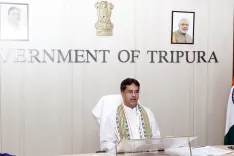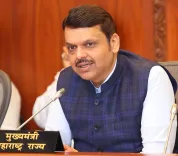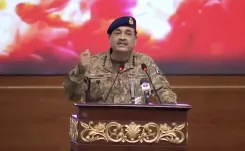Does India Have a 'Legitimate Right' to Act in Self-Defence Against Pakistan?

Synopsis
Key Takeaways
- India has the right to defend itself against attacks.
- John Bolton emphasizes the need for clear justification for military responses.
- The US has criticized Pakistan for its role in terrorism.
- Diplomatic solutions are crucial to avoid wider conflict.
- Both nations must focus on reducing terrorist activities.
New Delhi, May 3 (NationPress) John Bolton, who served as the US National Security Advisor (NSA) under President Donald Trump from 2018 to 2019 and previously as the US Ambassador to the United Nations, has asserted that while a broader conflict in South Asia is undesirable, India possesses a legitimate right to defend itself against Pakistan following the tragic April 22 Pahalgam terror attack, where four terrorists, two of whom were identified as Pakistani, killed 26 innocent civilians based on their religious identity.
In a special interview with IANS, Bolton, who was in office during the Pulwama attack in February 2019 - also orchestrated by the Pakistan-based terrorist group Jaish-e-Mohammad that resulted in the deaths of 40 CRPF personnel - remarked on the unfortunate situation in Jammu and Kashmir, where ongoing terrorist activities hinder the local populace's ability to live in peace and deter tourism.
"It's crucial to thoroughly investigate the circumstances surrounding this incident. During my tenure as NSA, we encountered a similar scenario in 2019, involving a terrorist assault originating from Pakistani territory. We worked closely with senior government officials at that time," Bolton explained to IANS.
"Our perspective then was clear: if the Indian government was assured that the attack originated from Pakistan and that the Pakistani government either failed to prevent it or actively facilitated it, then India had the right to respond in self-defence. I believe this principle holds true today. India must demonstrate convincingly the context that justifies any military action they choose to undertake. While no one desires a broader conflict in South Asia, the threat posed by terrorist attacks must not be taken lightly. Hence, self-defence is entirely justified," he added.
Bolton noted that the United States has been addressing the issue of Pakistan for an extended period, particularly in the challenging context following the events of 9/11.
"Both Republican and Democratic administrations have recognized that state-sponsored terrorism is unacceptable. Terrorist activities emanating from Pakistani soil will ultimately be linked to the government if they do not take appropriate action. While it's a complex process, I remain concerned about the threats posed by terrorist groups operating within Pakistan and across the border in Afghanistan," he stated.
Numerous nations, including the United States, have acknowledged Pakistan's involvement in supporting, training, and financing terrorist organizations, including notorious groups like Lashkar-e-Taiba and Jaish-e-Mohammad, which have persistently targeted India.
"This has been a topic of discussion with the Pakistanis for many years, and the Indian government has similarly engaged with them. The lack of progress is understandably frustrating. Therefore, if India can validate its reasons for acting in self-defence, it is justified in using military force. I am not suggesting that the US should intervene; I doubt either side would prefer that. Ultimately, these political issues should be resolved through diplomatic means rather than through terrorism," Bolton remarked.
With Pakistan's Railway Minister Hanif Abbasi recently declaring that Pakistan's nuclear arsenal is aimed at India, Bolton criticized the provocative rhetoric emerging from Islamabad.
"Such statements are unhelpful. Pakistan does not genuinely desire a full-scale military confrontation with India. They understand the relative strength of their conventional military forces and the perilous consequences of escalating conflict, which could lead to scenarios no one should contemplate. Provocative remarks do not assist in resolving the crisis. Whatever course of action India decides in self-defence, it possesses a legitimate right to do so. Nonetheless, I hope both nations focus on addressing the core issue: the spate of terrorist attacks that India should not have to endure and that Pakistan should prevent," concluded Bolton.






